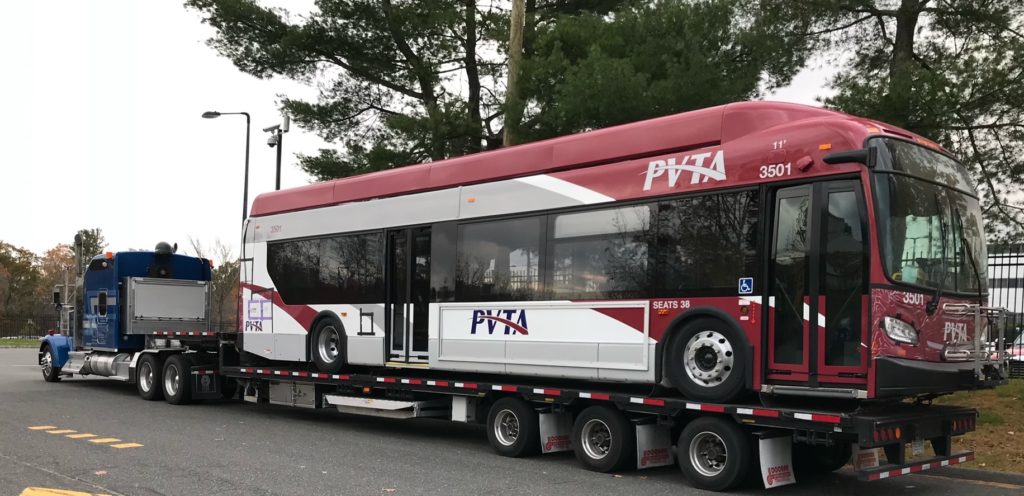UMass Transit Receives First All-Electric Bus From PVTA

UMass Transit put its first electric bus into service in December 2021. Photo: umass.edu
Source: UMass News and Media
UMass Amherst has received its first all-electric bus from the Pioneer Valley Transit Authority (PVTA). The bus, which will be operated by UMass Transit, will start its service in December following the installation of a 150-kilowatt charger and cabinet in the UMass Transit garage, which will be used to charge the vehicle.
The bus, a 40-foot New Flyer XE, was delivered to campus last week on a flatbed trailer. The bus’s range, in ideal conditions, is 230 miles. It will be used during normal operating hours, according to Glenn Barrington, transportation manager at UMass Transit.
“This is the first delivery of the next generation of buses that will serve UMass and the Five Colleges,” Barrington said. “We are receiving one this year and two in 2022 from PVTA.”
Barrington noted that the PVTA buses are on a 12-year replacement schedule. This year, PVTA replaced four buses first purchased for UMass in 2007. The new all-electric bus will replace one of those four buses. Next year, UMass will receive two more all-electric buses as it replaces five older buses. The other new buses run on diesel fuel.
The new all-electric bus costs $919,721 and was purchased by PVTA with funds from the Volkswagen court settlement. Other aging buses in the UMass fleet were replaced with federal funding received by the PVTA.
“Transitioning to alternative fuels demonstrates the PVTA’s commitment to reducing our carbon footprint and improving air quality in the Pioneer Valley region,” said Sandra Sheehan, administrator of PVTA. “This new bus brings our total alternative fuels fleet to 15 buses throughout the Pioneer Valley.”
More information about UMass Transit Services, including how students can apply to be a UMass bus driver, can be found online.

Kudos to both Glenn and Sandra for helping to kick this operation off!
As battery technology improves (foremost are increases in battery life and its energy-storage/mass ratio), these electric buses have the potential to become the workhorses of our public transit fleet.
For long-duration daily operation, however, either the spent battery packs will need to be swapped several times each day, or a very rapid recharging will need to be installed (this unfortunately tends to degrade the battery and reduce its overall lifetime).
I look forward to The Indy continuing to report on this operation!
For the (electric) motor-heads among us readers, see
https://cptdb.ca/wiki/index.php/New_Flyer_Industries_XE40
for a few more details.